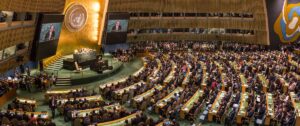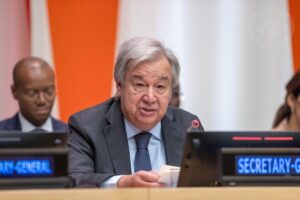Executive Summary
“[T]he choices we make, or fail to make, today could result in further breakdown, or a breakthrough to a greener, better, safer future … it will be important to hold a high- level, multi-stakeholder ‘Summit of the Future’ to advance ideas for governance arrangements in the areas of international concern mentioned in this [Our Common Agenda] report, and potentially others, where governance arrangements are nascent or require updating.”
–UN Secretary-General António Guterres
Fears of rising conflict, new Covid-19 variants, irreversible climate change, and eroding collaboration in the global economy threaten to undermine the 2030 Agenda for Sustainable Development and other efforts to advance human progress. Yet, a once-in-a-generation opportunity to review and dramatically improve global tools for managing such enormous challenges—a Summit of the Future—is under serious consideration for September 2023 by the United Nations’ 193 Member States. Coping better with the “Four Cs” and other global challenges will require carefully designed intergovernmental and multi-stakeholder negotiations, culminating in the adoption of a proposed “Pact for the Future” and related instruments. Without the active and creative engagement of civil society and the business community, however, the Summit may end up merely tweaking the global governance system—rather than weighing seriously more ambitious solutions commensurate with today’s threats and opportunities.
Building on the UN75 Declaration and Global Conversation in 2020, the Pact for the Future will also benefit from the application of new conceptual tools, including by enriching—through a just security framework—UN Secretary-General António Guterres’ notions of new social contracts, a new global deal, and networked and inclusive multilateralism as presented, in September 2021, in his seminal report, Our Common Agenda. Applying a just security lens, as advocated by the 2015 Albright-Gambari Commission on Global Security, Justice & Governance, means that any solution to a global problem must address both security and justice concerns, without privileging one over the other, in order to have any prospect of lasting success.
Informed by research and policy dialogues—initially undertaken for the Albright-Gambari Commission but continued to debate and elaborate upon key proposals in Our Common Agenda—this report’s twenty main recommendations are intended to encourage more ambitious, forward-looking thinking and deliberation on global governance renewal and innovation in the run-up to next year’s Summit of the Future:
Section III: Conflict Prevention and Management for Building Peace
1. Advance Inclusive and Just Peace through a New Agenda for Peace: The spirit of the original, 1992 Agenda for Peace can be recaptured by a new and dynamic approach to sustaining peace and just security in the twenty-first century, focusing on prevention, the changing nature of conflict, innovations in Women, Peace & Security and Youth, Peace & Security, and reform of the UN Collective Security Architecture.
2. Increase Representation in the Security Council for Strengthened Collective Security: The Security Council must reflect today’s geopolitical realities and the multilateral principle of inclusive, collective action that is the UN’s cornerstone. The Summit of the Future, with impetus from the Russian invasion of Ukraine, can help to generate political momentum and offer a much-needed deadline for progress on both issues: representation and misuse of the veto.
3. Prevent and Recover from Conflicts through a new Peacebuilding Council and Audit: Upgrading the Peacebuilding Commission into an empowered Peacebuilding Council will allow the United Nations to address second- and third-order conflicts, freeing up the Security Council to focus on first-order threats. This new body would lead on conflict prevention (through a new Peacebuilding Audit tool) and peacebuilding policy development, coordination, and resource mobilization.
4. Boost the Reach of the International Court of Justice and International Criminal Court for Global Justice: A well-functioning, peaceful, and rules-based international order requires respected and well-functioning international courts working in balance with state sovereignty. Strengthening international courts to fulfill their mandates means increasing their enforcement powers, preserving their independence, and enhancing their resilience.
5. Develop the Secretary-General’s Proposed Emergency Platform and Associated UN Rapid Crisis Response Capacities: Stand up a new Emergency Platform within the UN system to better anticipate and prepare for future global shocks and large-scale crises, supported by a proposed Standing Civilian Protection Service to augment UN capacities for peacebuilding, peacekeeping, and humanitarian purposes.
Section IV: COVID-19, Representation, and Human Rights Promotion
6. Fight Future Pandemics through a Global Health Threats Council and Pandemic Framework Convention: A Global Health Threats Council should be established to monitor global health risks and coordinate among states and non-state actors for preparation and prevention. It could help draft a Pandemic Framework Convention to clarify the responsibilities of Member States and international organizations and provide a template for future pandemic preparedness and response.
7. Strengthen the UN Human Rights Council and Human Rights Treaty Monitoring System to Better Protect People: The UN Human Rights Council and Human Rights Treaty Monitoring System should be strengthened by opening the Council’s elections to greater scrutiny; increasing accountability of Council members through a code of conduct; enhancing enforcement of its decisions by expanding cooperation with international human rights courts; and ensuring meaningful consultation with a wider range of non-governmental organizations.
8. Bring New Voices into UN Decision-Making through a High-Level Civil Society Champion: To make the United Nations more “people-centric,” we suggest a High-Level Civil Society Champion or Envoy who works across the UN system to increase civil society’s contribution to policymaking and implementation. Specific interventions are increasing the capacity of civil society groups to engage effectively with Member States, improving UN agency standards to address bottlenecks to civil society participation, and championing new voices from the Global South and younger generations.
9. Engage with and Empower Young People through a UN Youth Office and Council: Taking forward UN75 Declaration commitment #11 and the Youth2030 Framework depends on expanding youth representation in politics and decision-making across the UN system, by establishing a well-resourced UN Youth Office, and standing-up a dynamic, representative, and strategic UN Youth Council, as an integral part of the new Office’s mandate.
10. Foster Intergenerational Equity through a Declaration, and Special Envoy for, Future Generations: As no office or institution with a global perspective, remit, or reach now speaks for or promotes the interests of future generations, a UN Declaration on Future Generations should be crafted and a Special Envoy for Future Generations established to promote and help ensure that future generations inherit a healthy planet.
Section V: Climate Action and Governing the Global Commons
11. Repurpose the Trusteeship Council to Better Govern the Global Commons: The Global Commons—comprising the high seas, the atmosphere, Antarctica, outer space and, increasingly, cyberspace—surrounds, supports, and sustains our world’s ecosystem and is vital to our economic prosperity. The international community should repurpose the United Nations’ all-but-defunct Trusteeship Council to exercise a new, carefully shaped role as a steward of the Global Commons, with a view to enhancing intergenerational equity and the well-being of future generations.
12. Rethinking the UNFCCC and COPs for Enhanced Climate Governance: Parties to the United Nations Framework Convention on Climate Change (UNFCCC) and the annual Conference of the Parties (COPs) should promote greater participation in decision-making by all signatory states regardless of size or status. Enhanced non-state and sub-national actor participation is also needed to ensure stricter multilateral climate agreement accountability.
13. Manage and Regenerate Natural Resources through Global Forestry Governance: A new Global Forest Management Body operating on the principles of Multilateral, Effective, Sustainable & Holistic (M.E.S.H) Governance would facilitate interaction between local, national, and regional levels of forest governance, and provide guidance on government engagement with non-state actors.
14. Make Green Technology More Accessible to Developing Countries to Combat Climate Change: The pernicious effects of climate change necessitate innovative approaches to assist vulnerable populations, including a licensing facility for green technology and an information sharing platform to strengthen the UN’s Green Technology Startup Hub. This would encourage licensing and transfer of technology to developing countries, while protecting intellectual property rights to incentivize the development of green technology and increase its availability worldwide.
15. Expand and Safeguard Connectivity through a Global Digital Compact: Challenges such as the digital divide, increased cyber-crime, and global disinformation underscore the need for a rules-based order governing all facets of digital life worldwide. Rooted in human rights, a Global Digital Compact could foster shared principles for addressing all aspects of the technological life-cycle—from its development, through to its accessibility and protection of rights online.
Section VI: Collaborative Economy and Promoting Global Public Goods
16. Accelerate Equitable Socio-economic Recovery through a G20+ Biennial Summit: Convene a Biennial Summit between the Group of 20, the UN’s 193 Member States, the Secretary-General, and heads of international financial institutions—during the General Assembly’s High-Level Week—to shepherd a more sustainable and resilient global economy. Importantly, focus this “G20+” on fostering socioeconomic recovery from the pandemic, mitigating and managing cross-border shocks, and addressing rising global economic inequality.
17. Revitalize and Streamline the General Assembly for Improved Global Decision-making: To revitalize and streamline the work of the United Nations General Assembly, the Office of the President of the General Assembly should be given greater authority to manage the Assembly’s agenda and monitor its implementation. When the Security Council fails to act in maintaining international peace and security, the General Assembly should invoke the Uniting for Peace resolution, in collaboration with a qualified majority of Security Council members.
18. Enhance Democratic Legitimacy and Effectiveness through a UN Parliamentary Network: Reducing the United Nations’ intertwined democratic and implementation deficits through a UN Parliamentary Network (UNPN) is a moral and practical imperative. By creating a formal channel for parliamentary input into UN governance, the UNPN would better align a country’s domestic policies with UN General Assembly resolutions, increase public awareness of UN policy priorities, and further accountability of the world body’s decisions.
19. Forge Sustainable Development Funding Compact that Leverages Public-Private Partnerships: Establish a Global Funding Compact with the participation of international financial institutions, governments, and the private sector that combines accountability tools with blended finance mechanisms aimed at increasing investment in the Sustainable Development Goals. At the same time, continued debt relief for least developed countries should be tied to commitments to fulfill the SDGs.
20. Combat Corruption and Illicit Financial Flows through an International Anti-Corruption Court: While Our Common Agenda stresses the need to “build trust” through combating corruption, a legal punitive response at the global level is missing. To combat illicit financial flows, which fuel both corruption and excessive income inequality, an International Anti-Corruption Court, based on the principle of complementarity with national jurisdictions and located in The Hague, is urgently needed.
To prepare for the September 2023 Summit of the Future and maximize its impact in line with a “just right” approach, seven steps are necessary and desirable:
- Design an inclusive, forward-leaning Modalities Resolution, focusing preparations from February 2023 around four inclusive thematic committees: i) peace, security, and humanitarian action; ii) sustainable development and COVID-19 recovery; iii) human rights, inclusive governance, and the rule of law; and iv) climate governance; their combined work would support a fifth, integrative Executive Committee.
- Set up a small UN Secretariat organizing team with expertise in communications and in the subject matters of the four thematic committees.
- Promote globally the findings and recommendations of the High-Level Advisory Board on Effective Multilateralism, which will issue its recommendations in early 2023 in support of the Summit of the Future.
- Encourage robust engagement across civil society worldwide by encouraging civil society participation in national delegations and in multi-stakeholder forums worldwide, whose proposals are then deliberated upon by governments.
- Build consensus around select global governance strengthening proposals, by encouraging Member States to rank options according to criteria involving desirability, policy impact, urgency, cost, and implementation feasibility.
- Adopt a Pact for the Future and other strategic frameworks for global action at the Summit to facilitate concrete, measurable, and adequately resourced commitments across the above mentioned four thematic areas.
- Establish Summit follow-through mechanisms to ensure effective coordination, monitoring, financing, and other actions to facilitate implementation.
Striking a balance—in the agenda for next year’s Summit of the Future—between national interests, global public goods, and enlightened global leadership will not be any easy task. The Summit’s proposed Pact for the Future would not resolve today’s colossal global problems overnight; it could set into motion a series of events and facilitate, over time, a more comprehensive and impactful overhaul of our international system and of the laws and norms that underpin it. Armed with this measured outlook that combines patience with courage and imagination, we cannot afford to aim for less, because nothing less than humanity’s future hangs in the balance.




